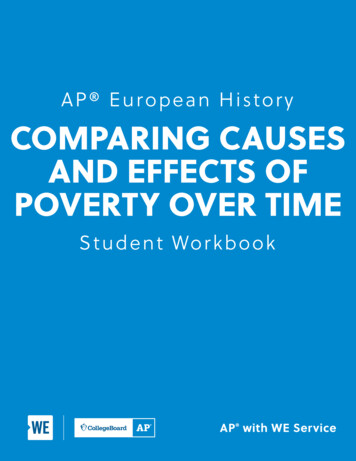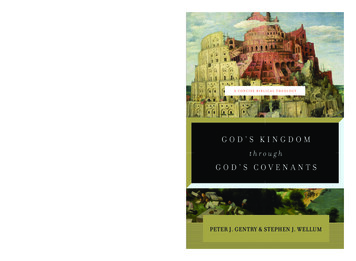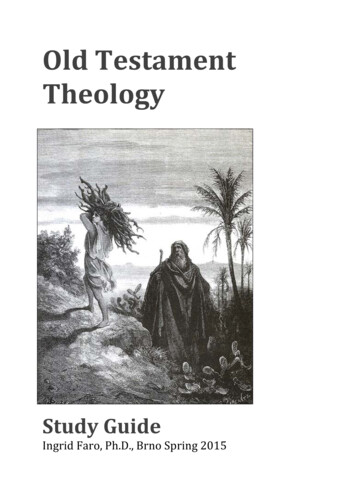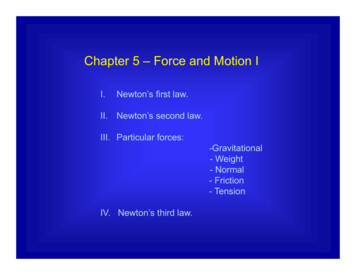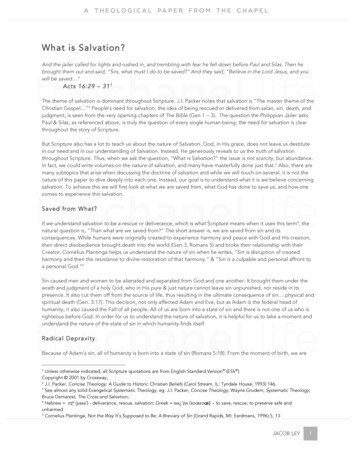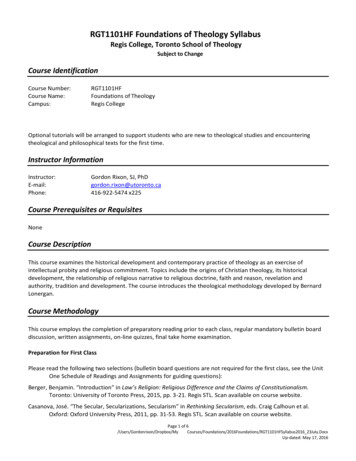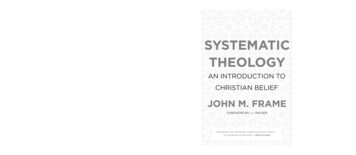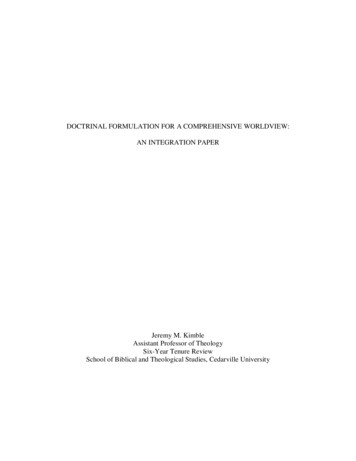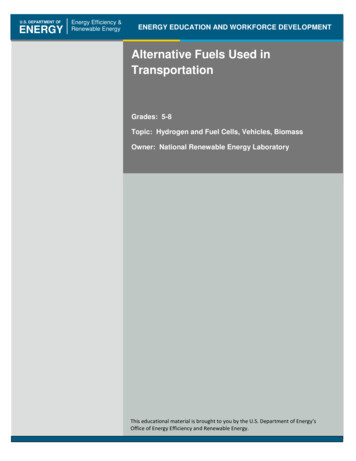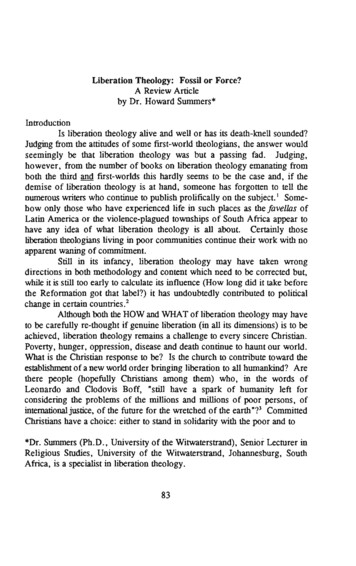
Transcription
Liberation Theology: Fossil or Force?A Review Articleby Dr. Howard Summers*IntroductionIs liberation theology alive and well or has its death-knell sounded?Judging from the attitudes of some first-world theologians, the answer wouldseemingly be that liberation theology was but a passing fad. Judging,however, from the number of books on liberation theology emanating fromboth the third and first-worlds this hardly seems to be the case and, if thedemise of liberation theology is at hand, someone has forgotten to tell thenumerous writers who continue to publish prolifically on the subject. 1 Somehow only those who have experienced life in such places as the favelllls ofLatin America or the violence-plagued townships of South Africa appear tohave any idea of what liberation theology is all about. Certainly thoseliberation theologians living in poor communities continue their work with noapparent waning of commitment.Still in its infancy, liberation theology may have taken wrongdirections in both methodology and content which need to be corrected but,while it is still too early to calculate its influence (How long did it take beforethe Reformation got that label?) it has undoubtedly contributed to politicalchange in certain countries. 2Although both the HOW and WHAT of liberation theology may haveto be carefully re-thought if genuine liberation (in all its dimensions) is to beachieved, liberation theology remains a challenge to every sincere Christian.Poverty, hunger, oppression, disease and death continue to haunt our world.What is the Christian response to be? Is the church to contribute toward theestablishment of a new world order bringing liberation to all humankind? Arethere people (hopefully Christians among them) who, in the words ofLeonardo and Clodovis Boff, "still have a spark of humanity left forconsidering the problems of the millions and millions of poor persons, ofinternational justice, of the future for the wretched of the earth"?3 CommittedChristians have a choice: either to stand in solidarity with the poor and to*Dr. Summers (Ph.D., University of the Witwaterstrand), Senior Lecturer inReligious Studies, University of the Witwaterstrand, Johannesburg, SouthAfrica, is a specialist in liberation theology.83
work with them for their liberation or to forget them completely, denyingtheir existence. Liberation theology, warts and all, remains the greatest challenge to churches in the first-world. It is far from "fossilized" and remainsa potent force for genuine democratic change.The following review of eight books (selected at random) may helpreaders to clarify their stance towards liberation theology. The sequencefollowed will, hopefully, guide those readers totally unfamiliar with theconcerns of liberation theology to gain a general understanding of the topicbefore some of the more specialised areas are dealt with.4 The books alsoprovide good examples of the diverse forms that liberation theology takes andthey also illustrate the point that liberation theology is not solely a LatinAmerica phenomenon.South Africa is presently a testing ground for both liberation andliberation theology. With a combination of first, second and third-worldinterests vying for power in the country, the final outcome is more than ofpassing academic interest to all South Africans. s Being a South African, thereviewer has assessed these books against this background - although this isnot stated explicitly in the reviews.C. Rowland and M. ComerLiberating Exegesis: The Challenge ofLiberation Theology to Biblical Studies.Louisville: Westminster/John Knox Press1989, 205 pp.This book is worthy of careful study, and is strongly recommendedas an introduction to liberation theology. As the title implies, the book,comprising five chapters, analyses the impact of liberation theology on(western) Biblical Studies.1) "Sampling liberation exegesis." Using a selection of Jesus'parables, Rowland and Comer give practical examples of the way liberationtheologians interpret the Bible and they penetrate quickly to the core ofliberation hermeneutics. The authors show how liberation theologians acceptthe historical-critical method of biblical interpretation but take it further,stressing not only the context of the original writers but also the context of themodem-day reader. Towards the end of the chapter the real concern of the84
book is introduced, viz, an attempt to find a liberation theology for the firstworld, more particularly Britain.2) "The foundation and form of liberation exegesis." This chapterprovides a theoretical outline of the methods used by liberation theologians tointerpret the Bible. Liberation theology is, according to its founding father,Gustavo Gutierrez, a "new way to do theology".6 It is new in that the "poor"become the hermeneutical key and, consequently, they become the "focalpoint of theology" as the authors point out (p44). A quotation from the textswnmarises this point of departure:At the heart of the theology of liberation is the twofoldbelief that in the experience of oppression, poverty, hungerand death, God is speaking to all people today and thatGod's presence among the millions unknown and unlovedby humanity but blessed in the eyes of God is confirmed bythe witness of the Christian tradition, particularly theScriptures themselves. (p43)The importance of the Christian Base Communities in LatinAmerican in providing this hermeneutical key is explained. These smallgroups which meet to study the Bible under specific socio-political conditionshave largely been responsible for the emergence of liberation theology. It isfrom these groups, where a "listening to the poor" takes place that mostacademic liberation theologians draw their inspiration.A closer scrutiny of the methods employed by liberation theologiansfollows in the second part of this chapter. Clodovis Boff s work is selectedas an example of a liberation hermeneutic. Boff s differentiation between"correspondence of terms" and the more acceptable "correspondence of relationships" is analyzed. The former applies when the biblical narratives areused analogously as the events and characters of first-century Palestine areconsidered to have a direct modem-day application. The latter refers to theintention of the original writers and outlines how this intention has beeninterpreted traditionally by the church. Despite what critics say about thishermeneutical method, Boff maintains that this approach is similar to that usedby the biblical writers themselves (p64) and is not a case of manipulating thetext--something of which liberation theologians are often accused.3) "Exploring the implications of liberation exegesis in a first world85
context. 1: The Political Gospel." In the first part of this chapter the ideathat Jesus was a political revolutionary is investigated and from there theauthors move on to a (excellent) summary of the materialist analysis of thebook of Mark as provided by Ferdinand Belo. What is lacking at this point,however, is a clear link between the first two chapters where predominantlyLatin American liberation theology is dealt with to a study where these selfsame writers are hardly mentioned. Although the authors are analyzing"liberation theology's" emphasis on the historical Jesus as well as thesignificance of the Book of Revelation, they do not adequately show theconnection between Latin American liberation theology and Belo's materialistanalysis. No mention is made of which liberation theologians use a materialistanalysis, nor is a clear indication given as to how materialist analysis affectsliberation theology. Suddenly, however, a return is made to "liberationtheology" (presumably Latin American) when Rowland and Comer begin tospeak generally about what "liberation theology" does or believes. Nodistinction is made between the different types of liberation theology (for thereare many) whicb supposedly support these generalizations.The last part of this chapter investigates the relationship betweenHistory and Eschatology (as a prelude to the next chapter where the book ofRevelation is dealt with). The writings of Cardinal Ratzinger (considered bymany to be enemy number one of liberation theology) are briefly consideredand some of his criticisms of liberation theology, particularly those relatingto the how and where of building God's kingdom, are analyzed. The chapterends with an examination of the themes of chiliasm and eschatologicalreservation.4) "Exploring the implications of liberation exegesis in a first worldcontext. 2: The Challenge of the Book of Revelation." The emphasis in thischapter is on the way the book of Revelation is used by oppressed groups. Alink is made between the book of Revelation and the "hermeneutics ofsuspicion" (Habermas) characteristic of the work of liberation theologians.The way the Apocalypse evokes the "subversive memory" and the "power ofthe past to disturb" (Adorno) is pointed out and the relevance of theseconcepts for liberation theology outlined.5) "Liberation theology in a first world context." The focal point ofthe book is reached when, in this last chapter, an attempt is made to point outthe need for a first-world liberation theology with Christians being challengedto work for the removal of world poverty. The issue of first-world guilt for86
third-world poverty is discussed, for example, "Britain's involvement in theoppression of the Brazilian poor" (pIS8). The point is also made thatChristian charity and aid will never solve the problems of third-world debtbecause far more money flows into the coffers of first-world nations by wayof debt repayments made by countries of the third-world than is paid out byfirst-world countries in aid. The challenge is also extended to the Church ofEngland for failing to take a stand against deteriorating social conditions inBritain. The authors maintain that there is an absence of a thorough socialanalysis of Britain as was undertaken in South Africa with the publication ofThe Kairos Document. 7When evaluating this book credit has to be given to the authors forlooking at the problems of world poverty and stating the need for theestablishment of a new world economic order. While most people are aware,however, that the present state of (economic) affairs is unsatisfactory, findingalternatives is not so easy and, while one admires the Christian concernexpressed by the authors, the solutions provided tend to be unrealistic andnaive. One is forced, therefore, to question many statements made in thischapter. For example:i) Superficially one can sympathize with the issue of Britain'soppressive role in Brazil's economy but the problem of poverty is far morecomplex than the authors suggest. If Britain is responsible for Brazil's debtis she also responsible for the situation in Somalia or Bosnia? No analysis ismade of WHY the poor are poor. While it is easy to blame the West, Thatcher, Apartheid, etc. what about corruption, over-population, the "patron"syndrome, maladministration, cultural factors, etc.? Although the authorswant a social analysis to be done they, themselves, do not undertake such ananalysis and, consequently, their arguments are unconvincing. No evaluationis made of Marxist economic policy and nothing said about the economicmiracles achieved by countries in the East or (more on the topic) the economicturnabout accomplished by Mexico, Chile and Argentina. As stated earlier,so much depends on HOW liberation should be achieved.ii) Although liberation theologians maintain that poverty is notglamorized in their writings but, on the contrary, is seen as something evil(p47) it is hard to escape the feeling that this is the case with someIiberationists--as well as with Rowland and Comer. Serious thought must,however, be given to this "hermeneutical key" for the illogicality of thisstance is obvious. If God is to be found (only?) among the poor, the aim of87
each and every Christian should then be to dispense with all materialpossessions and live as the poor. For, if there is no poverty, where is God?Why liberate the poor if this is where God is to be found? A serious examination must be undertaken of the effect this "henneneutical key" has on themethodology employed by liberation theologians.iii) The authors will have to make a far stronger case for thenecessity of establishing a first-world liberation theology. Why is liberationtheology needed in the first-world when these societies are the ones to whichmost of the third-world aspire, as is evidenced by the influx of third-worldimmigrants to first-world countries? As stated above, it is simplistic to statethat the frrst-world grew rich at the expense of the third-world without providing a thorough substantiation as to why this is so.iv) A status is conferred on The Kairos Document which not even thewriters of that document grant to it. Was it really a grassroots creation?Rowland and Comer uncritically accept it without even questioning how someof the signatories regard the document today or what effect it has had on theliberation process in South Africa.Despite these criticisms the book is well worth reading as it launchesthe reader into the heart of liberation theology. The authors achieve what theyset out to do for one is left with the clear impression that a clinical, detachedstudy of the Bible will never again be acceptable. Rowland and Comer haveshown how the concern of liberation theologians with "the poor" has virtuallyensured that not only is there a "new" way to do theology but there is alsonow a "new" way to do Biblical Studies!R. S. Sugirtharaja, ed.Voices From the Margin:Intemreting the Bible in the Third WorldMaryknoll,Orbis1991, 444 pp.1ltis is a book of contextual theology with contributors coming fromsuch diverse places as Korea, Israel and Pakistan--proof that liberationtheology is not confined to Latin America but that it's concerns are universal.As the title implies, this book is comprised of a selection of writings from the"third-world", a tenn which refers not only to countries of the third.:world but88
any "people who face harassment and exploitation wherever they are" (p3).Consequently writers from minority groups (Afro-Americans, NativeAmericans, women, et at.) found in the first-world are also included. Theeditor states:The essays assembled here are representative examples ofthe hermeneutical trek of a people attempting to make senseof their faith and their scriptural text in the light of theircontext. . What these essays demonstrate is that all biblicalinterpretations are contextual and arise out of lifeexperience . (p434)While some of the writers are well-known liberation theologians,others are not and the editor's aim in giving these third-world writers theopportunity to express themselves is twofold. Firstly, he wants to drawattention to those on the periphery of society and secondly he wants to givethird-world theologians the chance to have their say as this is often deniedthem because they are not taken seriously by western academics (ppl-2).This book also deals with the question of hermeneutics--how theBible is to be interpreted in situations of poverty and oppression. Accordingto the editor, Euro-Americans do not have all the answers regarding biblicalinterpretation yet, for those willing to listen to the voices of the marginalised,a wealth of new insights and ideas are waiting. The book is divided into fiveparts:Part one entitled: "Use of the Bible: Methods, Principles andIssues" challenges the starting point of western theology. Third-world writersexplain how the Bible is interpreted in their particular contexts. Much of thischapter is similar to the first part of Rowland and Comer and, in fact,Clodovis Bofrs article relating to "correspondence of terms" and "correspondence of relationships" forms the opening chapter.Part two entitled, "Re-use of the Bible: Examples of HermeneuticalExplorations" continues the theme but more insight is provided into theparticularity of contextual interpretation. For example, Itumeleng Mosala, theSouth African black theologian, provides a materialist reading of the book ofMicah (note the discussion on Ferdinand Belo in Rowland and Comer) whichhe sees leading to an authentic black theology of liberation. Mosala hasanother chapter in the first part of the book and when the two are read in89
conjunction, one discovers Mosala's rejection of much of "orthodox" blacktheology and his insistence that: "Black Theology for its part will have todiscover black working-class and poor peasant culture in order to find foritself a materialist hermeneutical starting point" (p59).Part three examines one of the major biblical themes appropriated byliberation theology, viz. the Exodus. 8 Entitled, "The Exodus: One Theme,Many Perspectives" the liberation of the Israelites from Egyptian slavery isseen as a model for third-world liberation today. A weak, oppressed peoplewho cried out to God for deliverance was liberated from the chains ofoppression. Two dissenting voices are raised against this model, however.The one by a Palestinian living in Israel, the other by a Native-American. Intheir present contexts both would see themselves as victims of "biblicalconquest" . The former writes, ". the Bible appears to offer to the Palestinians slavery rather than freedom, injustice rather than justice, and deathto their national and political life . " (p281) while the latter states: "I read theExodus stories with Canaanite eyes" (p289).Part four, "One Reality, Many Texts: Examples of Multi-faithHermeneutics" deals with problems encountered in those countries whereChristians are a minority. The two major issues are economic poverty andreligious pluralism.The approach to liberation in situations whereChristianity is not the dominant religion requires entering into dialogue withother religions and discovering where Christian and non-Christian views onliberation coincide. 9Part five, although a very short section, is extremely important.Entitled, "People as Exegetes" it is the actual texts of discussions held byvarious Christian communities in the third-world. Here, readers who havenever had the opportunity of meeting, for example, with members of aChristian Base Community are able to gain insight into the workings of thesegroups.A handy resource, this book should be on the shelves of everytheological library. A word ofwaming, however! Reading the short excerptsprovided by the different writers sends one off in haste to read the original(and lengthier) works from which the contributions are taken.90
R. MunozThe God of ChristiansMaryknoll: Orbis1990, 192 pp.Translated from the Spanish by Paul Bums.This book is a superb introduction to theology done in terms of an"option for the poor". A Chilean theologian, Munoz spells out in Section Iwhat a "new" way of doing theology means to people living in a context ofpoverty and political oppression when he penetrates to the heart of liberationtheology by wrestling with the "new" concept of God--one who sides with thepoor and oppressed. Munoz's commitment to the poor and his concern fortheir liberation come out forcibly in his writings for he writes from a situationof solidarity with the third-world poor who are getting poorer and,consequently, are close to despair.One ray of hope in this depressing scenario, according to Munoz, isthat more and more poor people are finding hope in the church, in this casethe Roman Catholic Church. It is in the Christian Base Communities,however, rather than the mainline church where this hope is to be found. Theimportance of these communities is stressed for this is where the "collectivememory" of the people is found. Poor Christians (and sometimes nonChristians) study the Bible IN COMMUNITY and learn of a God who is FORthe poor and oppressed, and AGAINST the practices of the rich and powerful.But this creates a dilemma: Which is the true God? The one revealed inJesus Christ who is with the poor in their daily struggles or the "god" who isused by military dictators and the powerful of this world to legitimize theiroppression and exploitation. One of these is the true God and one an idol.Careful study of the Bible IN COMMUNITY reveals a concept of a God whosides with the poor and oppressed and who is with them in their struggle,willing the end of poverty and the liberation of the oppressed. Consequently,God is seen as working through these Christian Base Communities which, likethe biblical community, are on a journey of faith. God is seen as the liberatorworking through the oppressed themselves for a just and righteous society.In Section II, Munoz attempts to relate this new concept of God tothe present experience of the poor and the changing circumstances of life inwhich people now find themselves. This is a serious attempt to discover howChristian faith, seen in terms of a God who sides with the poor, is relevant to91
the lives of poor people, particularly the yOWlg. Munoz sees the challengebeing how to, "bridge these gaps between our image of God, the Bible, andour lives" (p80).Section III is an attempt to re-read both Old and New Testaments inthe light of this "new" Wlderstanding of the concept of God who exercises an"option for the poor." This section is more academic in that it relies to agreater degree on scholarly works than the previous two sections but whetherthis section is necessary for the overall message of the book is debatable. Thefirst two sections contain a richness which is lacking in this last section wherethe scholarly contribution is somewhat dated. This should not, however,detract from a book which deserves serious study. It is indispensable forsomeone wanting to Wlderstand what doing theology in a "new" way means.R. ShaullThe Reformation and Liberation TheologyLouisville: Westminsterl10lm Knox Press1991, 136 pp . .Writing in his usual lucid style, Shaull challenges first-worldChristians to find ways not only of transforming their churches but society aswell. He considers present-day, first-world protestant churches (hereafterreferred to as the church) in a state of decay. Locked into "privilege andpower" they have become zones of comfort and security and are,consequently, unable to respond to the enormous challenges facing them and,therefore, unable to help transform society. (pp22,89).The church has lost its way in a secular world and forgotten the richheritage of its "refonnation" origins which led to such effective renewal of thechurch at the time. Just as church was "reinvented" in the sixteenth centuryso it must be "reinvented" today, not simply for the sake of the church but inorder to transform society. How is this to be done? The answer, accordingto Shaull, is to be fOWld in turning back to the theological resources providedby the Reformation and to discover how the Reformation can provide thechurch with the tools needed to renew it today. In other words" a "New"Reformation has to be sought!.Signs of this "New Reformation are already present in the liberationtheology emanating from the Christian Base Communities of Latin America.92
According to Shaull, these communities are considered models for churchrenewal, models which will enable the church to be reinvented, therebyfacilitating its task of helping to transform society (pp68,95). Shaullenvisages the Refonnation heritage being able to provide theologicalguidelines for the Christian Base Communities. The aim of the book,therefore, is an attempt:". at a dialogue with the Refonnation from the perspectiveof liberation theology in order to propose an approach anda project which I believe should be taken up not only byscholars but also by communities of faith, especially thoseclosely identified with the struggle of marginal andoppressed people" (pI8).In attempting to show the relevance of the Refonnation for the"New" Reformation, Shaull draws on the teachings of Luther, Calvin and theAnabaptists. The four themes which are relevant to church renewal today are:i) Luther's doctrine of justification by faith. ii) Access to the Bible foreveryone. iii) The church always being open to self-reform as well as beingable to transform society on account of the "protestant principle" i.e. "thedesacralization of all human achievements, institutions and structures" (p78).iv) The Anabaptist teaching on the separation of church and state.In Shaull's view there is a similarity between the conditions whichbrought about the Reformation and those existing today in the third-worldwhich have led to the emergence of liberation theology. Both eras arecharacterized by the insecurity of life and a dominating and oppressivechurch. The Reformation was thus a liberating experience. Although Shaulladmits that it was not a political but a spiritual liberation, the Reformation,nevertheless, became a movement for social transformation because therefonners relativised all secular authority on the basis of "the protestantprinciple" .Shaull outlines the contribution made by the Anabaptists to theReformation and its relevance for church renewal today. For the Anabaptistsa study of the Bible IN COMMUNITY (predominantly a poor one) lead toradical discipleship. The same holds true for the Christian Base Communitiesand, consequently, radical discipleship must characterise any attempt atchurch renewal today. The Scriptures must be re-read by the church of the93
rich without "ideological blinkers" (p77) and these churches must learn howto listen to the Word IN COMMUNITY and not impose a first-world interpretation on the Bible--if they are to be renewed.Christians in the first-world are, therefore, challenged to becomeinvolved in the struggle for justice (pl00). The church has to hold fast to thevision of a transformed society (p 103) and operate in a similar way to theChristian Base CommWlities of Latin America (p 10 1) by siding with the poorand oppressed and working for justice and an egalitarian society. The bookis more of a challenge to Christians to work out ways of transforming societythan a blueprint as to how this should be done. Shaull stresses the need fora balance between social commitment and spirituality for only in this way canthe church be reinvented!Although Shaull appears to Wlcritically accept much of liberationtheology, his challenge is well taken and the book deserves careful reading.Although some knowledge of liberation theology would be required for aproper understanding of the book, it is writte.n in a way that any lay personcould follow.J. and S. RonsvalleThe Poor Have Faces:Loving Your Neighbour in the 21 st CenturyGrand Rapids: Baker Book House1993, 156 pp.This book, too, is a challenge to first-world Christians, particularlythose domiciled in the USA. While both "spiritual" good news and "social"good news are envisaged, the book is concerned mainly with the latter for theRonsvalles claim to have fOWld a way to solve the problem of world poverty.Their theory is that on accoWlt of the incredible amoWlt of technologyavailable as well as the excessive wealth of a great number of Christians infirst-world cOWltries, it should be a matter of ease to solve the problem ofpoverty in the third-world if Christians would increase their giving, howeverslightly.The authors suggest that the USA be divided into regions "with eachregion being responsible for a different segment of the third-world. Thisentails "yoking"-first- and third- worlds being "yoked" together. First-world94
Orristians would, consequently, be given a greater sense of involvement withone particular area of the third-world rather than being "overwhelmed" by theincomprehensiveness of world poverty. Involvement in one small area wouldalso prevent the duplication of resources which is often the case at present.The authors, who by choice live amongst the poor, stress the fact thatit is not only money which is necessary but the idea of partnership isimportant. "Yoking" entails entering into a "co-operative partnership" withthe underprivileged whether they be Brazilians, Chinese or poorer membersof one's own society. Thus "the poor" are not seen as statistics but becomepeople who "have faces".Partnership, however, involves servanthood. Consequently, theauthors are aware of the danger of imposing ideas on the poor and the needfor indigenous people themselves to suggest where help can be given. So, forexample, the Chinese church needs to be a Chinese phenomenon. Stress mustbe placed on the need for long-term development and a guarding at all timesagainst dependency and the patron mentality (p5I).Despite the authors being aware of this need for long-term solutions,however, the message of the book seems to be "charity" for the bookoversimplifies the problem of poverty. Too much time is spent on describingconditions and the way of life in China and no in-depth social analysis madeof the reasons for world poverty and long-term solutions to the problem.Questions such as: Why is America a rich country? Why is there poverty inthe world? Why do people not want to improve their quality of life? Why isthere a "lack of political will" to remove poverty (the authors are aware ofthis)? Most importantly: What guarantees can be given that conditions willcontinue to improve once first-world expertise and cash are no longeravailable? It is essential that answers to these questions be carefully thoughtthrough for it is not enough to accept that indigenous people will know howto solve their own problems.Liberation theology provides a much greater awareness of thirdworld problems and seeks to get people to take respons bility for their ownlives and in so doing to change the structures on which an unjust society isbuilt. While it may be necessary to have charity as a short-term solution,liberation theology seeks to remove those structures which makes charitynecessary in the first place.However admirable the intention of the authors, the book cannotrealistically be seen as an attem
Although both the HOW and WHAT of liberation theology may have to be carefully re-thought if genuine liberation (in all its dimensions) is to be achieved, liberation theology remains a challenge to every sincere Christian. Poverty, hunger, oppression, disease and death continue
